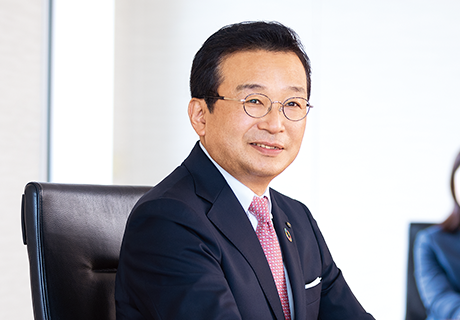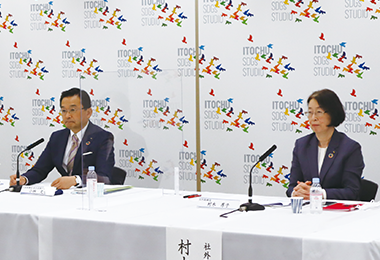CAO Interview

We aim to enhance corporate value and strengthen sustainability by taking various frontline-focused measures to turn words into accomplishments.
Member of the Board, Executive Vice President, CAO
Fumihiko Kobayashi
Q1. How did you ensure employee safety during the pandemic and the Russian invasion of Ukraine?
A1. We gave top priority to ensuring the safety of employees on the front lines, and implemented prompt measures such as workplace vaccinations and evacuation abroad.
First and foremost, ITOCHU’s work style constitutes a commitment to the front lines. Even during the COVID-19 pandemic, many of our customers are constantly operating at the forefront, such as supermarkets striving to keep their shelves full of offerings, convenience stores that are open on a 24/7 basis, and home-delivery service providers committed to delivering goods on time. These endeavors ceaselessly support the daily lives of consumers. Everything depends on those taking care of the front lines, and ITOCHU positions its businesses at the very front of the lines. Mere talk about prioritizing people on the front lines is not enough. We have to always ensure the safety of frontline employees. Right when the COVID- 19 pandemic began, ITOCHU set up a robust infection prevention system within the Company and Group companies. Since then, we have flexibly adjusted the working system 24 times (as of July 31, 2022) to meet frontline needs. To prioritize employee safety, when workplace vaccinations were initiated across Japan in June 2021, ITOCHU conducted these at the fastest speed among domestic companies.
When the Russia–Ukraine situation arose in February 2022, ensuring the safety of stationed and local employees was top of mind, and we took swift action. For example, in addition to temporarily evacuating and repatriating stationed employees, we provided emergency relief funds to local employees and, in the event that they and their families needed to flee the country, the staff of ITOCHU offices in neighboring countries arranged shelter for them.
Q2. What was the story behind holding the Sustainability Briefing (May 2022)?
A2. We wanted all stakeholders to understand that the Company’s string of work-style reforms enhance strengthening the Company’s sustainability.

the Evolution of Work-Style Reforms
Originally, briefings for analysts and institutional investors primarily focused on matters related to financial information, such as business results, management plans, and growth strategies. The importance of explanations related to financial information remains unchanged, but I noticed a significant uptick in opinions and questions related to nonfinancial information in the last few years. At various briefings, there has been more interest in certain topics from an ESG perspective, such as GHG emissions reduction, human rights considerations in the supply chain, diversity, and promoting the advancement of women.
A major reason for this briefing was not only to respond to these opinions and questions but also to enhance the understanding of analysts and institutional investors regarding the effect of the Company’s string of work-style reforms aimed at creating a challenging but rewarding corporate environment, thereby enhancing labor productivity and corporate value, as well as strengthening the Company’s sustainability.
As mentioned at this briefing, now-Chairman & CEO Okafuji took office as President in FYE 2011 and implemented measures in rapid succession, including the Morning-Focused Working System, the formulation of the ITOCHU Health Charter, Support Measures for Balancing Cancer Care and Work, spearheading workplace vaccinations, and introducing a work from home system for all employees and the Morning-Focused Flextime System. In addition, because we continually disclose all these efforts, our measures have become significantly influential on the Japanese society as a whole.
By explaining these various measures along with the stories behind their introduction, I think this briefing has helped analysts, institutional investors, and diverse stakeholders to better understand ITOCHU.(→ Sustainability Briefing)
Q3. As chair of the Sustainability Committee, what issues do you face and what roles does it perform?
A3. Issues such as climate change are discussed and reviewed from a cross-divisional perspective.
Sustainability and ESG have been growing in importance recently, and social demands are accelerating, as are legal and regulatory obligations. In ITOCHU’s case, material sustainability issues, such as GHG emissions reduction and human rights considerations in the supply chain, are not limited to specific departments. Rather, they encompass the entire Company.
The Sustainability Committee is a valuable forum for the General Managers of the Planning & Administration Departments of all eight Division Companies and the General Managers of Headquarters Departments to meet and discuss Companywide issues. At committee meetings, it is essential to share the importance of issues through active debate and, subsequently, for the entire Company to come together to implement measures that ultimately gain the committee’s consensus. As chair of the committee, I aim to run the committee to foster this kind of awareness.
In recently held Sustainability Committee meeting, various topics were addressed. Among those, there was particularly active debate around the topic of climate change and specific approaches to achieve the medium- to long-term targets ITOCHU set for reducing GHG emissions. Because every Division Company participates in the committee, we can hold discussions from a cross-divisional perspective, overcoming the boundaries of product silos. I feel this is one major reason the committee is vital.
In addition to stimulating vigorous discussion, the committee places great emphasis on reviewing the Sustainability Action Plans, which incorporate identified material issues for specific businesses and initiatives. In each business sector, we identify key sustainability risks and opportunities for each Division Company, make medium- to long-term commitments, establish approaches as well as performance indicators for achievement, and conduct an annual review of the progress on each action item. This enables every member of the Sustainability Committee to become familiar with the numerous initiatives outside of their own Division Company. Moreover, I think discussing the initiatives from a wide range of perspectives has helped each Division Company expand the scope of its own projects.(→ Initiatives to Promote Sustainability)
Q4. The second stage of work-style reforms was based on the results of an engagement survey. What are the key points of these reforms?
A4. By introducing more flexible work styles, we will help employees better tap their full potential.
Since FYE 2011, we have rolled out unique measures, including the Morning-Focused Working System, with the rationale that the promotion of work-style reforms contributes to enhancing labor productivity. The results of the engagement survey we conducted in December 2021 showed that our figures remain at the apex of leading companies in Japan. Nevertheless, compared with FYE 2019, there was a drop in positive responses in percentage terms for some topics. Hence, we will strive to improve our figures. From the results of the analysis, including on-site hearings, we concluded that introducing more flexible work styles would help employees better tap their full potential, especially for young employees and female employees. The Morning-Focused Working System had already gained widespread support among employees, and we evolved it even further by introducing the Morning-Focused Flextime System to realize a work style where employees who arrive early leave early. We enabled more flexible work styles by allowing employees to use this system and work from home, which became widely practiced during the pandemic, according to their specific work and personal situations. In addition, we realized that many young employees hope to grow by overcoming a wide range of challenges and building their own careers, so we enhanced the current in-house recruitment system and expanded interviews between employees and superiors regarding their personal career progress. Moreover, we conduct training that emphasizes the front lines, such as dispatching employees overseas as early in their career as possible and allowing them to experience a wide range of duties, as we work to increase the speed of training.
Our aim of realizing a corporate environment that is challenging but rewarding to work for remains unchanged as the basic policy of our human resource measures. By “challenging,” we mean that employees need to always be aware that they are expected to achieve results through their work and that those results need to help enhance the Company’s sustainable profitability and corporate value. This was also based on our experience and lessons learned when we aimed to become an employee-friendly company. At that time, misconception arose that employees could enjoy benefits even if they did not embrace the challenges of work. Hoping to be a company where anyone, regardless of gender, can thrive at work while staying vigilant to their responsibilities, we will continue working to create a challenging but rewarding corporate environment.(→ Human Resource Strategy)
Q5. Please tell us tactics for human resource acquisition.
A5. We will continue to hire “merchants” by conducting hiring activities from a student’s perspective and carefully communicating the appeal of our Company to students.

The number of non-consolidated employees at ITOCHU is significantly lower than that of other general trading companies associated with the former zaibatsu industrial groups, at around 70% in comparison. We will remain a small select organization of capable individuals as a policy. Regarding the hiring of excellent human resources, the pandemic limited opportunities to interact with students face-to-face. Hence, we provided employment information to students using such diverse methods as online visits with senior employees, more frequent online seminars with added topics, and in-person seminars that minimize infection risks. In addition, to enhance understanding of ITOCHU’s corporate culture, we conducted hiring activities by putting ourselves in students’ shoes, such as promoting branding on social media, beginning hiring activities in the Metaverse in FYE 2022, and creating and utilizing virtual reality (VR) spaces for students. In recent years, ITOCHU has garnered very high praise for clinching the top spots in company rankings among jobseekers. For the most recent class of 2023, we were the No. 1 general trading company in company rankings among job-seekers according to major institutions. For all industries, we ranked No. 1 in four out of seven major institutions. These rankings stand as a tall testament to our appeal and hiring power in Japan. ITOCHU’s most valued management resource is, without a doubt, people. We will continue to hire “merchants” who can sensitively perceive changes in the world from a broad and comprehensive perspective as they undertake challenges for the future with nimble, innovative thinking.
Q6. How do you roll out work-style reforms and other human resource strategies across the Group?
A6. We disclose all measures our Company has implemented to promote and support Group companies’ own initiatives.
At Group companies, it is also important to take human resource measures that fully tap each employee’s potential. Group companies consider human resource measures that align with their unique characteristics, and, during that consideration process, we ask that they start with implementing what they can of the various work-style reform measures ITOCHU has rolled out. To promote such effort, we have openly shared details of our work-style reforms with Group companies. Many Group companies have already introduced the Morning-Focused Working System and health management measures that ITOCHU spearheaded. Those companies have reaped benefits similar to ITOCHU by reducing unnecessary overtime and creating sought-after time for many of their employees, not just for those who face time restrictions due to childcare or nursing care. For example, employees have voiced that the measures, such as in terms of sharing housework and childcare between spouses or enabling self-development, have led to motivation for work. Furthermore, we have heard that better health management has helped foster peace of mind among employees. Since entering the second stage of work-style reforms, the Company is asking its Group companies to again consider evolving their work styles based on the issues identified by ITOCHU.
In addition, from the perspective of enhancing consolidated management, we are providing meticulous support in hiring, training, and labor management in line with each Group company’s situation. For example, regarding training, we are working to expand programs for all Group companies, including joint training for new hires and training for supervisors. For a long time, we have implemented a special program to develop future managers by bringing together national manager candidates of foreign nationalities from Group companies overseas, although for the last few years this program has been temporarily suspended due to the COVID-19 pandemic. In this and other ways, we have rolled out the Group’s human resource strategy in Japan and overseas. To appropriately cope with a rapidly changing labor environment, ITOCHU’s robust support also includes providing information on legal revisions and holding workshops related to labor cases across Group companies.
In line with the corporate mission of “Sampo-yoshi,” we will strive to roll out the Company’s work-style reforms and other human resource measures to Group companies as we aim to be a corporate group where every employee works with pride and job satisfaction.
